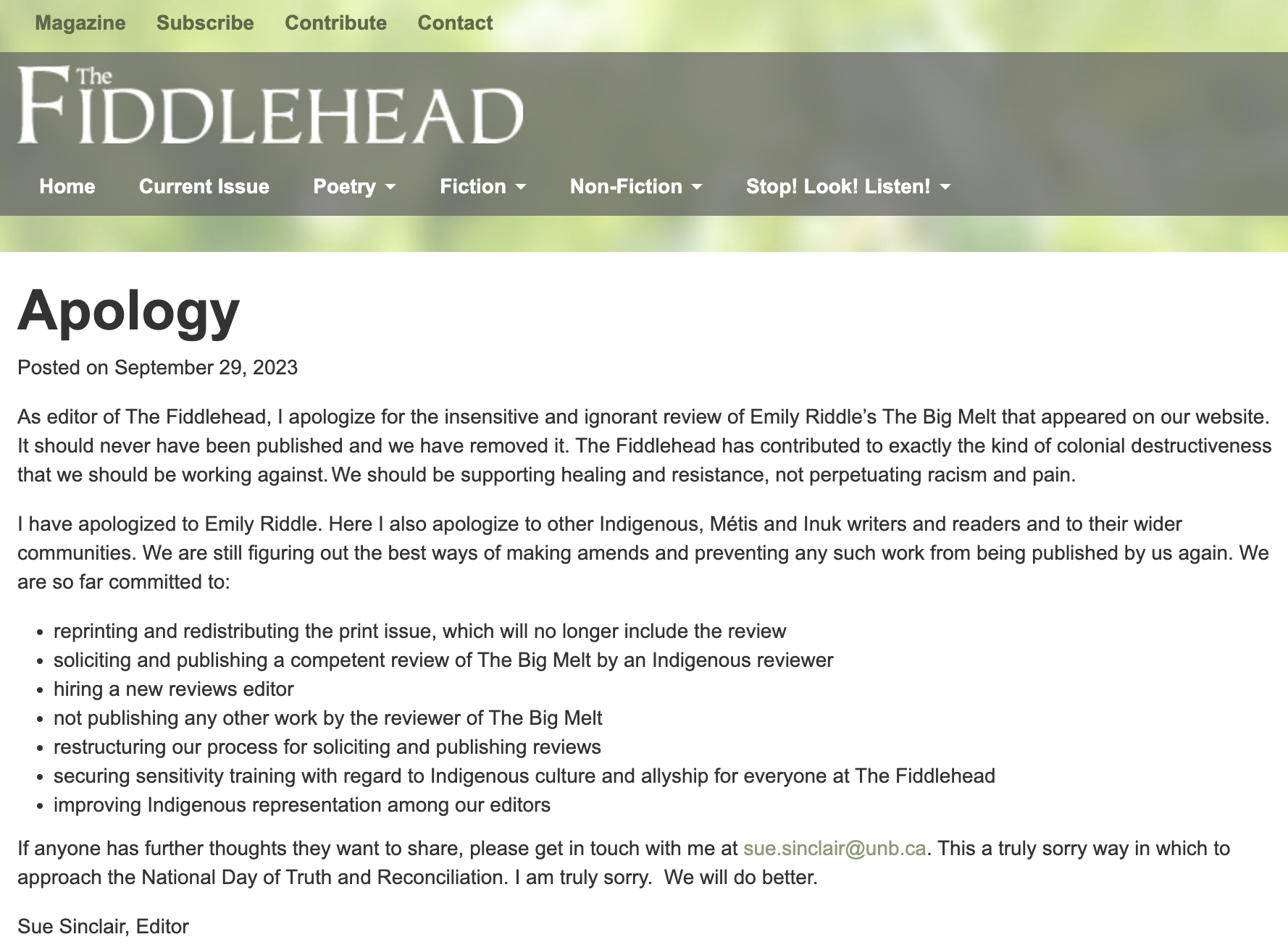 Andrew Rai Berzins’ writing includes Cerberus (short fiction), as well as the screenplays for the CBC movies – Scorn, Chasing Cain (1 & 2), and Cowboys & Indians. His first produced feature screenplay – Blood & Donuts – was butchered under the auspices of the Canadian Film Center. His other feature screenplays include Beowulf & Grendel and – heading soon into production – “Remind Me.” A second collection of short fiction – “Ventriloquism” – is currently seeking a press.
Andrew Rai Berzins’ writing includes Cerberus (short fiction), as well as the screenplays for the CBC movies – Scorn, Chasing Cain (1 & 2), and Cowboys & Indians. His first produced feature screenplay – Blood & Donuts – was butchered under the auspices of the Canadian Film Center. His other feature screenplays include Beowulf & Grendel and – heading soon into production – “Remind Me.” A second collection of short fiction – “Ventriloquism” – is currently seeking a press.
For a well-established screenwriter, what does publication in a literary journal like The Fiddlehead do for you?
It warms my heart – as well as my brain. The Fiddlehead’s older than I am – by over a decade – so I look up to it, as to an elder. They published three of my early stories in the 90s, so I have an attachment. Also it’s a reassurance that I might still be able to play the game.
Cerberus, your collection of short fiction, was published by Goose Lane Editions in 1993. After that, it looks like you switched over to screenwriting. Between fiction and screenwriting, which is the most personally satisfying?
To me that’s like choosing a favourite child – which I wouldn’t do. I think they just serve slightly different creative impulses. As to the “switch,” I started both around the same time – early 1980s – but just had more initial success with stories. By 1993, my second child was born, and screenwriting – if you can get it – pays a few more bills than prose fiction, especially the kind to which I’m inclined.
Will you now be switching back to fiction?
I never really stopped writing fiction. It just became more of a struggle – to find the time and justify the time. And if you get a long enough string of magazine rejections, it can sort of dampen the enthusiasm. Beyond that, it took me some years to get over the disappointing response to Cerberus.
Can we look forward to another collection in the future?
I’ve got one ready to go. “Ventriloquism.” Sent it out once. Waited the recommended 6 months before inquiring as to its status. Actually gave the press another couple months before following up. The email response was that the rejection had been mailed out months previous – and must have gotten lost. It was suggested that I blame Canada Post. That was a year ago. So – yeah – I’m slowly assembling the nerve to send it out again.
If I said that your story, “Baby Gaga,” in The Fiddlehead No. 274, reminded me of “Raising Gazorpazorp,” Episode 7, Season 1, of Rick and Morty, would you be insulted or flattered?
Neither. Let’s say – amused. I haven’t followed the show (though my sons do) but I tracked down the episode. I did laugh.
Are you attracted to the short story form because it is unaffected by anyone else’s input, concerns, budgets, or schedules?
It’s “unaffected” only in the sense that you can do with it as you like – but you can do the same with a screenplay. In both cases though – getting published or getting produced – you are appealing to others’ agendas – whether it be a magazine editor or a film producer. There may appear to be more freedom in writing stories (particularly ones that shift out of our mundane reality), but I suspect that’s illusory. Seems to me theme-issues are more prevalent than they used to be, and magazines/quarterlies are generally reducing the accepted length (often now under 3000 words). But, in the sense that a prose writer can more practically create “worlds” than can a screenwriter (excluding animation), yeah, there’s some attraction to that.
Most of what I’ve heard about screenwriting has come from screenwriters writing about it their screenplays. Can you confirm or deny any of these screenwriter clichés?
1. Everyone has self-serving notes on how your original script should be changed.
Widely differs. Certainly not everyone. Some producers certainly – as well as some overly self-involved actors.
2. Screenwriters aren’t as respected or celebrated as other creative roles such as directing and acting.
Absolutely true. And strangely there are many people within the industry who do respect screenwriters and strong scripts. The bigger problem is with journalists and media. By comparison, consider how playwrights are treated. We – playwrights and screenwriters – use almost all the same tools – character, scene/location, dialogue, theme, story, tone – to construct the work. The only significant difference I see is that a screenplay never gets made again, whereas a play can be resurrected endlessly. In that sense, a play’s director and producer must be aware that someone around the corner can outdo them in six months time, and – thus – perhaps show the script (and writer) more respect. One of my little lame conspiracy theories…
3. Screenwriters are seen as supportive and minor instead of critical and central.
More true than false. Again, consider the different standing accorded playwrights. Not sure if a screenwriter has ever been awarded the Order of anything…
Are screenwriters expected to live close to traditional areas of production like Vancouver, Toronto, New York, and Los Angeles? Is it possible to work from a remote location?
If you want to work in TV, yeah, it’s critical to be near ground-zero. Years ago when TV shows (at least in Canada) would outsource a few of their dozen+ episodes, there were writers who could work long-distance. I did a couple times. But you usually had to already have connections with the show. These days it seems almost all writing is done in-house, within the localized story-department. Features are a bit different. You can write one anywhere. Then the monstrous challenge is getting it in front of the right eyes.
Does having a deadline help or hinder your production?
For me it helps. Like a lot of people, I am sorely afflicted with procrastination.
How does a screenwriter build a good reputation?
Very tricky question. This hinges on the word “good.” In my case I have a good reputation with some people, and a shitty one with others. Some years back an ex-agent told me I’d developed a reputation for being “difficult.” I wasn’t sure what the alternative was: easy? From my admittedly biased pov, all I’d ever really tried to do was defend the interests of the story, tone, and characters in a script, and get paid on time. Right now I’m working with some good people who think my reputation is pretty okay.
Is original idea production the most important thing, or is it the ability to be flexible, the ability to write out a major character and sub in a different one in a couple of days?
Sorry – I broke up your multiple question – to vent about personal reputation. The qualities you note above are all valuable, but their relative value depends on the production. I think “original idea” is absolutely essential for features. It’s the only way to get others on board. Within a TV story department, the other qualities may hold more weight – being flexible and collaborative and leaving your ego at the door – something I wasn’t always all that good at.
Is it something else?
Again, with regard to reputation, it depends on who is gauging. I think creativity, honesty, integrity, empathy, diligence and enthusiasm cover most of the bases. In that the industry is rife with weasels, bullies, sycophants, and ladder-climbers, personally I welcome being accorded a poor reputation by some.
What is a typical path for someone who wants to be a screenwriter?
I’m far from the best person to try to answer this. Firstly, I don’t know if there’s a typical path. When I entered university in the 70s, I’m not sure if there was a screenwriting class offered anywhere in Canada. (My degree was in Drama.) Now there are multiple options to get an MFA in just that. And I expect that path has benefits – to, at the very least, get the basics and rid oneself of bad habits – if you can afford it. The old path was to just write spec scripts then cold-call production companies and hope they’ll give it a read. Now with social media there are numerous opportunities to network, which changes the contact-game enormously. It might seem that film/TV in Canada is thriving but, from where I sit, every year there are more screenwriters – both aspiring and “established” – competing for access to static or diminishing funds. Changes over the last decade+ at Telefilm have further limited options for writers. Personally I’m back to where I started 35 years ago, writing scripts on spec. Living in the hope.
Theoretically speaking, if the owner of a very successful space movie franchise spent hundreds of millions on computer affects and very successful, talented, well-recognized actors, but did not appear to give a fuck about dialogue, to the extent that the lines given to actors were so dull and lifeless that said actors appeared to be very bored, or under the influence of powerful sedatives, how would you explain this course of events? If giving a million dollars or even half a million to a competent writer to produce a workable, interesting script would have saved said theoretical project from critical scorn, why do think that would not be done?
Great question. I’ve wondered often also. Either the majority of the audiences for said franchise don’t generally give a shit about that element, or the studio execs believe they don’t give a shit, or the studio execs don’t recognize the issue. Personally I don’t follow said franchise. One I do – Guardians of the Galaxy – is brilliantly written and directed by the same person, in which case the subtleties and nuances and fucking wit of the script manages to make it to the screen.
Who has been most helpful in your development as a writer? How were they helpful?
Two people. First, a high-school English teacher, the late Gord Bartlett. I was 15 and submitting some crazy shit in creative writing – and he was categorically encouraging – reassuring me that I wasn’t acting out, but actually tapping in to some deep streams. (I believe that was the year he had us tangle with Beckett’s “Waiting for Godot.”) Second, my partner of 40 years – Mary-Ellen – also a writer. Though we have different sensibilities, she’s always got what I’m going for, and offered clarity to the path.
What does an established writer owe new and emerging writers?
I’m not sure. The truth?




I like the matter-of-fact nature of the answers to these questions. The practicality. My heart sank a little for the author — and the state of publishing — when he so blithely accepts the fact that of course it will take a publisher 6 months to evaluate a manuscript, and of course Canada Post must be the culprit if a rejection gets sent out but is never received. Berzins is gracious enough to phrase it so as not to imply that the publisher’s explanation is — is there a nice word for “bullshit”? — but when are things ever lost in the mail? Anyhoo, no matter whose mistake it was, it just seems so tragic that it all adds up to a full year that the writer has to have waited, and then has to summon the enthusiasm to throw the ms. back into the Pool of Many Months again.
Yes. How did we ever come to accept such poor service as business-as-usual? Oh right, because of a massive power imbalance. It’s interesting that the American journals and small publishers are much better with response times even though they face the same difficulties with money and labour. I’m glad that you’re having so much success with your self-published book. Are sales past 300 now? A few hundred more and you will approach sales figures for an average release out of a Canadian small press? Not sure. Just guessing. Perhaps I was wrong about the value of gate keepers.
Yes, we are at or over 400 in sales now.
And looking to add a zero to the end of that. Well done!